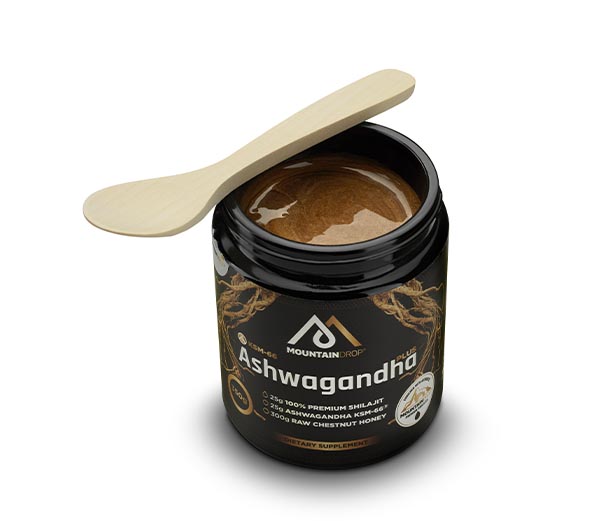Ashwagandha je hviezdou vo svete rastlinných liekov, známa pre svoje prirodzené liečivé schopnosti. Nie je to len rastlina, je to zdroj zdravia, plný špeciálnych zlúčenín, vďaka ktorým je vhodný pre tých, ktorí hľadajú prirodzené posilnenie svojho zdravia. Jedným z tajomstiev zdravotných účinkov ašvagandy sú withanolidy, silné prvky, ktoré zohrávajú veľkú úlohu v účinnosti rastliny.
V tomto blogu sa bližšie pozrieme na withanolidy. Preskúmame, čo sú, ako pôsobia v našom tele a aké výhody ponúkajú. Ide o kombináciu tradičných poznatkov a modernej vedy, ktorá nám poskytne ucelený pohľad na potenciál ašvagandy.
Ak ste teda zvedaví na prírodné zdravie alebo ste už fanúšikom Ashwagandhy a chcete sa dozvedieť viac o tom, čo ju spôsobuje, ste na správnom mieste. Pátrame do hĺbky, aby sme odhalili fakty a ponúkame jasný a zrozumiteľný pohľad na silu, ktorá je v tejto pozoruhodnej rastline obsiahnutá.

Withanolidy sú základom terapeutických vlastností ašvagandy. Tieto prirodzene sa vyskytujúce steroidy sa v rastline nachádzajú v hojnom množstve, čo ju označuje za významné ohnisko v oblasti botanickej medicíny. Sú základným kameňom účinnosti ašvagandy a dodávajú jej rozmanité zdravotné účinky, vďaka ktorým sa stala základom tradičných liečebných postupov.
Tieto zlúčeniny sa vyznačujú schopnosťou modulovať fyziologické reakcie a ponúkajú vyvážený prístup k zlepšeniu telesných funkcií. Okrem iných zdravotných aspektov zohrávajú kľúčovú úlohu pri znižovaní stresu, posilňovaní imunitného systému a zlepšovaní kognitívnych funkcií. K ich bioaktivite prispieva zložitá molekulárna štruktúra withanolidov, vďaka ktorej sú predmetom intenzívneho výskumu.
Jedným z najviac skúmaných withanolidov je Withaferín A. Je známy svojimi protizápalovými vlastnosťami, vďaka ktorým je Ashwagandha prírodným prostriedkom na zníženie zápalu a bolesti. Pôsobí tak, že moduluje zápalové reakcie organizmu, čím ponúka úľavu pri stavoch, ako je artritída a iné zápalové ochorenia.
Vedcov zaujímajú najmä adaptogénne vlastnosti withanolidov. Adaptogény sú látky, ktoré zvyšujú schopnosť organizmu odolávať stresorom, či už fyzikálnym, chemickým alebo biologickým. Withanolidy v ašvagande prispievajú k odolnosti organizmu a pomáhajú udržiavať homeostázu aj v stresových podmienkach.
V oblasti imunity posilňujú withanolidy obranyschopnosť organizmu. Zvyšujú imunitnú odpoveď a zabezpečujú, aby bolo telo dostatočne vybavené na odvrátenie infekcií a chorôb. Imunomodulačný účinok withanolidov sa pripisuje ich schopnosti regulovať aktivitu imunitných buniek, čím podporujú vyváženú a účinnú imunitnú odpoveď.
Pozoruhodné sú aj metabolické účinky withanolidov. Prispievajú k energetickému metabolizmu organizmu, čím zabezpečujú, že produkcia energie v bunkách je efektívna a zodpovedá požiadavkám organizmu. Tento aspekt je obzvlášť prospešný pre zvýšenie fyzickej výkonnosti a vytrvalosti.
Withanolidy sú v podstate komplexnou, ale neoddeliteľnou zložkou ašvagandy, ktorá je základom jej váženého postavenia v bylinnej medicíne. Ich mnohostranné zdravotné účinky svedčia o holistickom prístupe k zdraviu a pohode, pretože ponúkajú prirodzený, vyvážený a účinný prostriedok na zlepšenie fyziologických funkcií.
Ďalšou oblasťou záujmu sú neuroprotektívne vlastnosti withanolidov. Tieto zlúčeniny podporujú zdravie mozgu, zlepšujú kognitívne funkcie, ako je pamäť, koncentrácia a učenie. Výskum ukázal, že withanolidy môžu zmierniť účinky stresu na mozog, čím podporujú duševnú jasnosť a odolnosť.
Napríklad štúdia uverejnená v časopise Journal of Dietary Supplements zistila, že extrakt z koreňa ašvagandy môže zlepšiť pamäť, výkonné funkcie, pozornosť a rýchlosť spracovania informácií u dospelých s miernou kognitívnou poruchou.
V tejto klinickej štúdii sa výskumníci zamerali na skúmanie účinkov extraktu z koreňa ašvagandy na kognitívnu a psychomotorickú výkonnosť u zdravých dospelých osôb s miernou kognitívnou poruchou (MCI). MCI je stav charakterizovaný výrazným poklesom kognitívnych schopností vrátane pamäti a myslenia, ktorý však nie je natoľko závažný, aby zasahoval do každodenného života.
Účastníci štúdie dostávali počas určitého obdobia extrakt z koreňa ašvagandy a ich kognitívne funkcie boli hodnotené pred a po zásahu. Na hodnotenie rôznych aspektov kognitívnych funkcií vrátane pamäte, pozornosti a rýchlosti spracovania informácií sa použili rôzne štandardizované testy a nástroje.
Výsledky boli sľubné. U účastníkov, ktorí dostávali extrakt z koreňa ašvagandy, sa výrazne zlepšili ich kognitívne schopnosti. Pozitívne ovplyvnená bola najmä pamäť, pričom jedinci preukázali lepšie schopnosti zapamätania a uchovania informácií. Extrakt zlepšil aj výkonné funkcie, ktoré zahŕňajú schopnosti, ako je riadenie času, pozornosť, zmena zamerania, plánovanie a organizácia a zapamätanie si detailov.

Výsledky tejto štúdie zdôrazňujú potenciál ašvagandy, najmä jej obsahu withanolidov, pri podpore kognitívneho zdravia. Neuroprotektívne vlastnosti withanolidov nielen zmierňujú účinky stresu na mozog, ale aj zlepšujú rôzne kognitívne funkcie, čím ponúkajú prirodzený prístup k zdraviu mozgu.
Adaptogénny charakter withanolidov pomáha telu prispôsobiť sa stresu a vyrovnáva fyziologické procesy počas stresových situácií. Modulujú uvoľňovanie stresových hormónov, čím podporujú relaxáciu, zlepšenie nálady a duševnú pohodu. Vďaka tejto adaptogénnej vlastnosti je ašvaganda obľúbenou voľbou na zvládanie úzkosti a depresie, čo potvrdzuje aj výskum v Indian Journal of Psychological Medicine, ktorý poukazuje na jej účinky znižujúce úzkosť.
Withanolidy tiež posilňujú imunitný systém. Posilňujú obranné mechanizmy organizmu, podporujú činnosť imunitných buniek a podporujú reakciu organizmu na infekcie a choroby. Imunitne posilňujúce vlastnosti ašvagandy, ktoré sa pripisujú withanolidom, sú dobre zdokumentované v tradičnej medicíne a v súčasnosti ich potvrdzuje aj moderný vedecký výskum.

Štúdia s názvom "Effect of Ashwagandha Withanolides on Muscle Cell Differentiation" (Vplyv Withanolidov Ashwagandhy na diferenciáciu svalových buniek), ktorá je dostupná na stránke NCBI, skúma, ako Ashwagandha, známa bylina, ovplyvňuje vývoj svalov. Výskum sa zameriava na withaferín A a withanón, dve kľúčové zložky, ktoré sa nachádzajú v ašvagande. Tieto prvky sa skúmali na svalových bunkách, známych ako myoblasty C2C12, aby sa pochopili ich účinky.

Zistenia sú zaujímavé. Withanón, najmä ak je ho v extrakte veľa, podporuje premenu myoblastov na myotuby, čo je kľúčový proces pri vývoji svalov. Pomáha tiež rozkladať proteínové agregáty, ktoré vznikajú pri strese z tepla a kovov, a aktivuje dráhy súvisiace s nízkou hladinou kyslíka a čistením buniek, známe ako autofágia.
Táto štúdia poukazuje na potenciál ašvagandy pri podpore regenerácie svalov a zvyšovaní svalovej aktivity. Dôkazy z experimentov s využitím modelu Parkinsonovej choroby na ovocných muškách, ktoré sú známe svojimi nervovosvalovými problémami, ukázali zlepšenie letových a lezeckých schopností po liečbe ašvagandou. Tieto zistenia nielenže poukazujú na účinnosť tejto byliny, ale zároveň otvárajú cestu pre ďalší výskum jej rozmanitých zdravotných prínosov, najmä pre svaly a nervovosvalový systém.
Skúmanie zdravotných účinkov withanolidov je dynamická a rozvíjajúca sa oblasť. Každá štúdia a klinická štúdia prináša nové poznatky a odhaľuje rozsiahly potenciál týchto zlúčenín pri podpore ľudského zdravia. Keďže naďalej skúmame ich mnohostranné prínosy, očakáva sa, že sa zaradenie withanolidov, najmä zo zdrojov ako Ashwagandha, do holistických zdravotných a wellness postupov rozšíri.
Za zmienku stojí Ashwagandha KSM-66, produkt, ktorý hrdo ponúkame. Na trhu vyniká svojím jedinečným zložením. KSM-66 je jediný extrakt z ašvagandy s obsahom withanolidov štandardizovaných na 5 %. To zabezpečuje vysokú koncentráciu týchto bioaktívnych zlúčenín, čím sa zosilňujú zdravotné prínosy spojené s ašvagandou.
Bezpečnosť a účinnosť withanolidov podporuje ich dlhá história používania v tradičnej medicíne a v súčasnosti ich potvrdzuje aj moderná veda. Očakáva sa, že s pribúdajúcimi údajmi sa bude rozširovať integrácia withanolidov do preventívnych a terapeutických zdravotných protokolov.
Predstavujú synergiu starovekej múdrosti a modernej vedy a ponúkajú riešenia, ktoré sú účinné a zároveň vychádzajú z prírody. Budúcnosť sľubuje hlbšie pochopenie a širšie uplatnenie withanolidov v našej snahe o optimálne zdravie a pohodu.

Ďalšie zdroje a informácie:

Copyright 2024 © Mountaindrop. Všetky práva vyhradené. Powered by EOSNET









